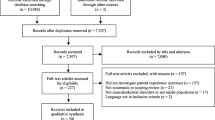Abstract
Chronic diseases compromise the life of the sufferer, encumber their families, and exert intractable burdens on the health-care system. With the aging of the population, such conditions have become the primary determinants of morbidity and mortality and the leading cause of disability in our society. Despite the serious challenges they impose, the ethical discourse engendered by them has lagged behind that of acute care medicine. Of particular relevance are the challenges to individual autonomy, as the dilemmas arising in the chronic care setting have not only medical but personal and societal dimensions, may require the input of multiple participants, and resolve over longer periods of time. As such, the conventional model of autonomy is often inadequate to address problems in the chronic care setting. This paper deals with this dilemma through an examination of a clinical scenario. A framework for the exploration of ethical problems in the chronic care setting is thus presented.
Similar content being viewed by others
References
The burden of musculoskeletal disease in the United States, 2008. www.boneandjointburden.org.
Medical Expenditure Panel Survey. 2004. www.ahrq.gov/about/cj2004/meps04 htm.
Gibson J, Upshur R. Ethics and chronic disease: where are the bioethicists? Bioethics. 2012;26(5):ii–v.
Parekh AK, Kronick R, Tavenner M. Optimizing health for persons with multiple chronic conditions. JAMA. 2014;312(12):1199–200.
Parekh AK, Goodman RA, Gordon C, HSS Interagency Workgroup on Multiple Chronic Conditions, et al. Managing multiple chronic conditions: a strategic framework for improving health outcomes and quality of life. Public Health Rep. 2010;126(4):460–71.
Callahan D. When self-determination runs amok. Hast Cent Rep. 1992;22(2):52–5.
Beauchamp TL, Childress JF. Principles of biomedical ethics. 6th ed. New York: Oxford University Press; 2009.
Dekkers WJM. Autonomy and dependence: chronic physical illness and decision-making capacity. Med Health Care Philos. 2001;4:185–92.
Charmaz K. Loss of self: a fundamental form of suffering in the chronically ill. Sociol Health Dis. 1982;5:159–95.
Bury MR. Chronic illness as biographical disruption. Sociol Health Illn. 1982;4:167–82.
Agich GJ. Dependence and autonomy in old age: an ethical framework for long-term care. Cambridge: Cambridge University Press; 2003.
Jennings B, Calahan D, Caplan AL. Ethical challenges of chronic illness. Hast Cent Rep 1988;18(1):1–15.
Hammer LB, Neal MB. Working sandwiched-generation caregivers: prevalence, characteristics, and outcomes. Psychol Manag. 2008;11(1):93–112.
National Alliance for Caregiving. Caregiving in the U.S. 2009. http://assets.aarp.org/rgcenter/il/caregiving_09-fr.pdf.
Kraiem DI. Consumer direction in Medicaid long term care: autonomy, co-modification of family labor, and community resilience. Am J Gend Soc Policy Law. 2011;19(2):672.
Singer GHS, Biegel DE, Ethridge BL. Trends impacting public policy support for caregiving families. J Fam Soc Work. 2010;13(3):191–207.
Davis LJ. Constructing normalcy: the Bell curve, the novel, and the invention of the disabled body in the nineteenth century. In: Davis L, editor. The disability studies reader. 2nd ed. New York: Routledge; 2006. p. 3–16.
Couser GT. What disability studies has to offer medical education. J Med Humanit. 2011;32(1):21–30.
Shakespeare T. The social model of disability. In: Davis LJ, editors. The disability studies reader, 2nd ed. New York; 2006. p. 197–204.
GBD. Mortality and Causes of Death Collaborators. Global, regional, and national age-sex specific all-cause and cause-specific mortality for 240 causes of death, 1990–2013: a systematic analysis for the Global Burden of Disease Study 2013. Lancet. 2015;385(9963):117–71.
Compliance with Ethics Guidelines
Conflict of Interest
C. Ronald MacKenzie and Inmaculada de Melo-Martin declare that they have no conflict of interest.
Human and Animal Rights and Informed Consent
This article does not contain any studies with human or animal subjects performed by any of the authors.
Author information
Authors and Affiliations
Corresponding author
Additional information
This article is part of the Topical Collection on Ethics
Rights and permissions
About this article
Cite this article
MacKenzie, C.R., de Melo-Martin, I. Ethical considerations in chronic musculoskeletal disease. Curr Rev Musculoskelet Med 8, 128–133 (2015). https://doi.org/10.1007/s12178-015-9271-1
Published:
Issue Date:
DOI: https://doi.org/10.1007/s12178-015-9271-1




